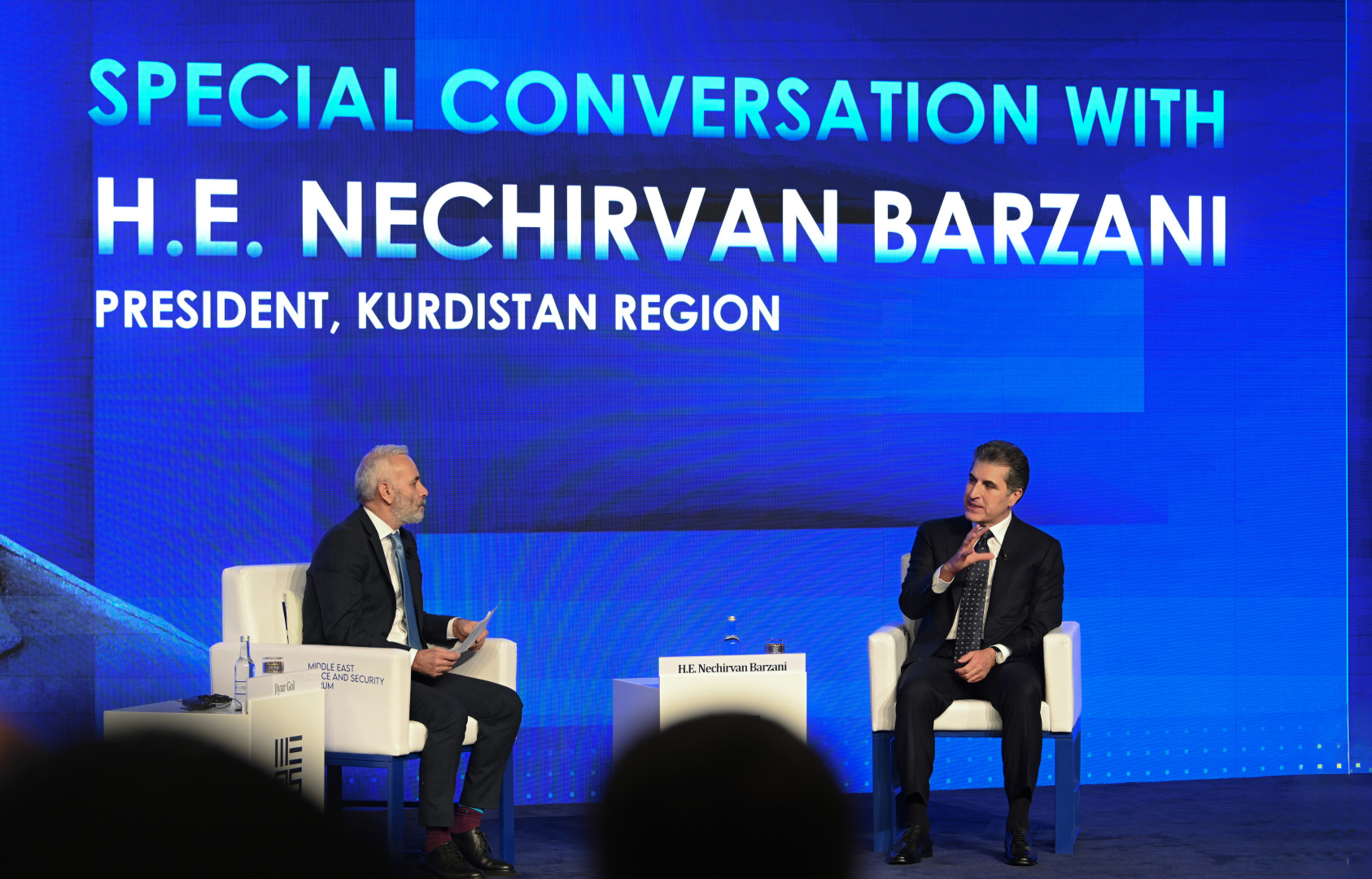
November 18, 2025
President Nechirvan Barzani participated in the Middle East Peace and Security Conference (MEPS), an annual event organized by the American University of Kurdistan in Duhok.
During a panel discussion, attended by Prime Minister Masrour Barzani, along with numerous senior Iraqi officials, academics, researchers, journalists, and guests from the Kurdistan Region, Iraq, and other areas, President Nechirvan Barzani spoke on several urgent matters related to the Kurds and the wider regional landscape.
The following is a readout of the panel discussion:
Moderator: Thank you, Mr. President Nechirvan Barzani, for your participation in this program. My terminology is quite mixed with Snai’ (a Kurdish dialect), and I hope you understand.
President Nechirvan Barzani: It's not an issue; we have been there for quite some time, and we understand it well.
Moderator: Over the past two years, the region has undergone many changes, from Lebanon to Israel, Syria, Iran, and Iraq. I am interested in understanding how Kurdistan has managed to protect itself against various challenges and sustain a level of security over this period.
President Nechirvan Barzani: Thank you very much. First and foremost, I would like to express my gratitude to the organizers of MEPS in Duhok. I truly appreciate their efforts in arranging this meeting and the organization they have established today. We witnessed a significant turnout at this conference. I extend my congratulations to the organizers and to Mr. Masrour. They have indeed done an excellent job with all the guides provided. Thank you very much; the Snai’ (dialect) is not an issue. On the contrary, we welcome it as a reminder. The Kurdistan Region has consistently aimed to be a contributor to peace and security in the region. Furthermore, we have played a role not only for the Kurdistan Region but also in Iraq, alongside our brothers in Baghdad, making every effort to ensure that the Kurdistan Region and Iraq do not become entangled in the regional issues that have arisen. The policy of the Kurdistan Region has always been to serve as a pillar of peace and stability in the area. This is a commitment that the Kurdistan Region has adhered to and will continue to uphold.
Moderator: In recent months, particularly during the Israeli offensive against Iran, Iraq has largely managed to sidestep this issue. However, Iraqi airspace has been traversed by Israeli warplanes, and Iranian missiles have crossed over it. I am interested in understanding how significantly this situation might influence the ongoing conflict in the Middle East, the regional powers, and the countries involved. What is your perspective on this matter in the region today?
President Nechirvan Barzani: As a principle, we do not subscribe to the idea that challenges can be solved through weapons and violence. We hold the view that the issues in the region require careful consideration and sincere dialogue to find a solution. The conflicts in the area have shown that they only bring devastation. When we look at the aftermath of these wars, we see widespread destruction across the region, including in Palestine and beyond. Nevertheless, we maintain that dialogue is the path to resolve these issues. We are encouraged by the current efforts addressing this matter. The recent UN Security Council resolution has marked a significant step forward regarding the efforts initiated by President Trump, and we are hopeful for its successful implementation.
Moderator: Some time ago, US President Donald Trump sent you a letter, followed by a more detailed letter from US Secretary of State Marco Ru bio regarding your activities and the situation in Kurdistan aimed at achieving peace and stability here. What do you perceive the US's role in the Middle East will be during President Donald Trump's second term? To what degree do you believe the United States can influence the region?
President Nechirvan Barzani: Naturally, the United States is a powerful force on the global stage. It stands as a superpower and can play a vital role in the region. Regarding our position in the Kurdistan Region, I mentioned at the start of our discussion that we have a clear policy. Our aim is to be a stabilizing influence in the area. We seek to resolve our issues with Baghdad peacefully through dialogue. Our intention is to contribute to regional peace and stability. The Kurdistan Region has demonstrated its role as a stabilizer, and in this context, we believe the United States can take on an important role in addressing both the Palestinian and Israeli issues, as well as other regional challenges.
Moderator: A few days ago, elections took place. The KDP, we can say, secured the highest number of votes among all parties and in Iraq; however, this morning I heard Iraqi Prime Minister al-Sudani announce the formation of a significant coalition of Shiite political parties aiming to form the next government. Is there a lack of unity among the parties in Kurdistan to collectively approach Baghdad and address issues that have arisen between Baghdad and the Kurdistan Region over the past few years, such as salary and security concerns? I was here two or three months ago when there were multiple attacks on the oil fields in the Kurdistan Region. How can these issues be resolved? Is there a shortcoming, or is there ongoing dialogue with other political parties in Kurdistan to present a united front in Baghdad?
President Nechirvan Barzani: I believe, as you mentioned, that this is essential. A consensus is required for the Kurdish forces to proceed to Baghdad in a unified manner. By uniting, we can reach the goals we all strive for. Although there are disagreements among the Kurdish forces within the Kurdistan Region, it is crucial to establish a formula that encompasses all Kurdish forces in Baghdad, with clear lines defining the Kurdistan Region's interests. Part of the issue lies in the parties' relationships. We have conflicts with one party, while another party has issues with yet another. While these conflicts are valid, what truly matters is our collective agreement on a singular objective. I believe it is imperative for the Kurdish forces to head to Baghdad promptly, armed with a unified agenda, to negotiate and establish a framework that delineates the interests of the Kurdistan Region, ensuring we do not stray from that framework. We have consistently emphasized the need for strength in Baghdad. The empowerment of the Kurds in Baghdad serves as a safeguard for both Iraq and Kurdistan. Therefore, what I advocate for and what we seek is for the Kurdish forces to proceed to Baghdad collectively, with a shared plan.
Moderator: Do you believe we might see a new constitution for Kurdistan within the next four years?
President Nechirvan Barzani: Our campaign slogan during this election emphasized that Iraq needs to implement the constitution before the constitution of the Kurdistan Region. This is a fundamental demand of ours, and it should be a collective demand from all Kurdish factions that the Iraqi constitution must be put into action. Primarily, the issues between the Kurdistan Regional Government and Baghdad arise from the constitution and its lack of enforcement. The way Baghdad engages with the Kurdistan Region is unconstitutional and excessively centralized. I consistently assert that the treatment and system applied to the Kurdistan Region are unlike any other federal system in the world. The Iraqi constitution was established, and we in the Kurdistan Region have been advocating for its implementation. This constitution ensures the coexistence of all Iraqi communities—not just those in the Kurdistan Region, but also Sunni, Shiite, Turkmen, Christian, and Yezidi communities. For Iraq to achieve stability, the foremost requirement is the enforcement of the constitution. Concerning the constitution of the Kurdistan Region, I regret to say that we should have realized this long ago. Last year, we conducted a highly successful election, thanks to the people of Kurdistan, which had a turnout of approximately 72 percent. We are hopeful that, following these elections in Iraq, we will witness the establishment of the Kurdistan Regional Government, and, naturally, the primary task and priority thereafter will be the constitution of the Kurdistan Region.
Moderator: I understand that you had discussions today in that back room with various Iraqi leaders, including the Iraqi prime minister and several other Iraqi parties. Are you hopeful that the upcoming government in Baghdad will possess the determination to address the issues?
President Nechirvan Barzani: After enduring a prolonged period of conflict and challenges, we are optimistic that everyone has reached the understanding that these issues need to be addressed. The foundation of peace and stability in Iraq is crucial for resolving disputes between the Kurdistan Region and Baghdad. I believe that if Iraq sincerely commits to tackling these challenges, it will enter a markedly different and more prosperous political phase. We hope that all Iraqi factions have learned from history, and that lesson is to regard this period as one focused on implementing the Iraqi constitution and resolving all issues with the Kurdistan Region in accordance with it.
Moderator: I understand you met with Turkish President Recep Tayyip Erdogan last month. Additionally, I am aware that a delegation of Kurdish parliamentarians from North Kurdistan visited the Kurdistan Region and engaged in discussions with you. The Kurdistan Region has initiated measures to promote this peace process. There are many concerns about this effort, similar to the situation in 2015. I believe Mr. Ahmet Davutoğlu is present here. I had the opportunity to interview him during that period. It is clear that many people genuinely hope for this process to succeed. I recognize that you maintain communication with all involved parties. To start, I would like to ask what specific measures the Kurdistan Regional Government has undertaken to support this process, and how hopeful are you that this peace initiative will have a different outcome than in 2015?
President Nechirvan Barzani: This is an important question. The Kurdistan Regional Government has consistently expressed its readiness to assist in this process, which we believe will benefit all communities in Türkiye and have a significant impact on the Kurdistan Region and the broader area. The Kurdistan Region's role has been to contribute to the success of this initiative. Your question relates to the seriousness of this process, correct? Based on my discussions in Ankara, particularly with Mr. President, I can affirm that this process is indeed serious. However, we must approach it realistically. A challenge that has persisted for forty years cannot be solved in an instant. This is a journey that requires patience. At times, it may seem like the process has hit a standstill, but that’s not the case; the cumulative results of these years can’t be seen in just a few months. I anticipate that this process may extend over several years, yet the progress so far in Ankara, along with developments on the other side, indicates that the pace may be exceedingly slow. The Kurdistan Region's role has been to ensure that the Kurdistan Regional Government does everything possible to support the delegation that arrived in Qandil. I reiterate, the Kurdistan Region's role is to assist both parties in reaching an agreement. From my observations and discussions in Ankara, there is a significant commitment to ensuring this process reaches its conclusion. What we have seen from Mr. Ocalan thus far is a strong emphasis on the need for this process to achieve a resolution and to advance towards peace that benefits everyone involved.
Moderator: The peace process in Turkey influences the (Kurdish) Rojava situation in Syria within the region. I understand you had a discussion with HSD commander Mazlum Abdi. Is he here?
President Nechirvan Barzani: He was expected to attend today. I asked about his absence. Mr. Masrour mentioned he could be on his way.
Moderator: (Jokingly) If he is indeed coming, I could extend our panel until his arrival?
President Nechirvan Barzani: (Laughter) That is your decision, but if he is on his way, he will not arrive shortly. It will take some time.
Moderator: My question is: As I understand, during your visit to Antalya, Türkiye, you met with Ahmed Al-Sharaa and Mazlum Abdi. I am aware that you engaged in discussions with both sides. The Kurdish community is eager to learn about the outcome of this experience in Rojava. I am curious about Türkiye’s important role in this. Everyone I have consulted, including diplomats and university professors, both today and yesterday, express considerable concern, noting that even those arriving from Rojava believe that the Syrian issue has potential for success. I would like to hear your perspective on this. As I mentioned earlier, you have had discussions with President Recep Tayyip Erdogan.
President Nechirvan Barzani: Let me start by saying that the Syrian people, as a nation, deserve a much better quality of life than they currently have. Today, there is a reality on the ground in Syria. His Excellency President Ahmed Al-Sharaa is there. We believe this situation presents a remarkable opportunity for Syria to achieve peace and security. Our message to our brothers in Syria has been clear: we have encouraged you to embrace the new Syrian flag and have consistently extended invitations for your participation. This is your country, your nation, and your future; it is essential for you to be actively involved in shaping Syria's destiny. That is the essence of our communication with our brothers. However, it is important to acknowledge that certain forces, particularly Mr. Mazlum Abdi and his allies, have played a crucial role in combating terrorism and addressing security issues, both within Syria and concerning the Kurdistan Region and Iraq. We do not see the centralized governance model in Syria as the appropriate approach. Syria is characterized by its ethnic, religious, and cultural diversity. We believe that a centralized, strong governance structure will not yield positive outcomes under the current model. A different approach must be considered. We are not advocating replicating the governance model in the Kurdistan Region. We have not suggested that; rather, we maintain that Syria needs to adapt its governance to reflect its unique traits and circumstances. Regrettably, there is a prevailing mindset in Damascus favoring a strong central administration. We do not believe that a strong centralist approach will improve Syria's future. We firmly believe that the rights of all communities within Syria should be recognized and that they must be empowered to attain these rights. The Kurdistan Region supports this perspective and is committed to helping facilitate this process. Regarding your comments, I perceive that Türkiye is quite eager to address these issues; however, I am skeptical that mere statements from Türkiye will lead to actual implementation. That is not my interpretation. On the contrary, I believe Türkiye has made efforts and will continue to strive to resolve these issues, but this remains an internal matter for Syria. The current administration in Syria must understand that it needs to propose a viable model for the country's future.
Moderator: A while back, in January, I was in Rojava. I had a discussion with General Mazlum Abdi. Their firm stance was that the Syrian Democratic Forces should remain the sole military entity and not integrate with the Syrian army. In your opinion, are Türkiye or the Syrian state prepared to meet the demands of Rojava?
President Nechirvan Barzani: I believe it is not feasible to join the Syrian army on an individual basis. This simply isn't practical. We encountered a similar issue with the Americans back in 2003, and Mr. Masrour is present here. The Americans insisted that we (the Kurdish forces) needed to be part of the new army. We responded that this was not practical or realistic. After three days of discussions, they eventually devised a name for the Peshmerga. They came up with the name “Mountain Rangers.” I recall when they asked Mr. Masrour, “What would it be, if we translated that name into Kurdish?” Mr. Masrour responded that it would become “Peshmerga”. The same applies to them. It's not realistic to inform them individually that they must join the Syrian army. A different approach needs to be established. Currently, for instance, the Al-hol camp poses the biggest challenge. Approximately 10,000 people, who are highly extremist and affiliated with ISIS, are imprisoned there. What will happen to these individuals? This situation must be addressed through dialogue between Damascus and our allies in SDF. We believe SDF must take certain actions as soon as possible. They have entered into some agreements since March, but none have been implemented. What are they waiting for? I can't say!
Moderator: Who hasn't implemented it?
President Nechirvan Barzani: Both sides have not yet implemented the agreement, although the majority of discussions focus on SDF’s lack of action. This situation needs to be addressed through dialogue. What are they waiting for? We observe the circumstances in Syria evolving daily. Hence, I believe the Kurds should seize this opportunity. These matters must be settled through dialogue as soon as possible. Our responsibility in the Kurdistan Region remains to assist and collaborate.
Moderator: I would like to pose this question, as I come from East (Irainian) Kurdistan. I recall that in January 2024, Iran launched a missile strike on Kurdistan Region, claiming to target an Israeli intelligence site in Erbil. Essentially, they accused the Kurdistan Regional Government of working with Israel against Iran. However, five months later, I remember your visit to Tehran, where you were warmly welcomed with a red carpet. Within two days, you met with Iran's Supreme Leader, Ayatollah Khamenei, the president, the speaker of parliament, and several other officials. What has transpired in the five months since you were accused of colluding with Israel against Iran?
President Nechirvan Barzani: I believe this requires some clarification. First, Iran is a significant neighbor to us, and the Kurdistan Region has consistently aimed to maintain positive relations with Iran without issues. For instance, if we only consider the economic side, trade between Iran and the Kurdistan Region is around $11 billion to $12 billion, with the majority occurring within the Kurdistan Region. The Kurdistan Region's stance has never been to support any party against the Islamic Republic of Iran. The Islamic Republic has provided us with assistance in the past, and we appreciate all the support it has given us. As I mentioned, our goal is to be a stabilizing force in the region. This has been our policy historically, it is our current policy, and it will remain our policy moving forward. I believe there have been some miscommunications between us and Iran. However, have we ever assisted any party against them? We have never engaged in such actions, nor will we in the future. I am confident that during our visit to Tehran, particularly after our discussions with the leader of the Islamic Republic of Iran and other Iranian officials, we established a mutual understanding on these matters, which persists today, and I hope it will continue.
Moderator: I would like to reiterate the question: Has there truly been a change in your policy, or were the allegations unfounded?
President Nechirvan Barzani: These allegations were entirely unfounded. It is not beneficial for the Kurdistan Region to engage in any issues against the Islamic Republic of Iran. I believe they have come to realize that more. It was not our doing. We have consistently expressed our gratitude to the Islamic Republic for the assistance it has provided us.
Moderator: Mr. President, we recognize that the Kurdish situation in Syria, Türkiye, and even Iran was significantly highlighted three years ago during the widespread protests. In your view, if the issues in North (Türkiye) Kurdistan are addressed and the Kurdish concerns in Rojava are settled peacefully, what effect would that have on the stability and economic conditions of the local people?
President Nechirvan Barzani: Over the years, how much has the policy of denial achieved in the region? The approach of denying the existence of the Kurds has proven to be ineffective. It has demonstrated that such a policy cannot succeed. We believe these challenges must be resolved with consideration for the circumstances of the Kurds in each respective country. You noted that there is a reality, such as the Kurdish issue in Iran, Türkiye, and Syria. These matters need to be addressed. The stance of the Kurdistan Region is that resolving these issues will lead to progress. We are not proposing a specific model or insisting that it must be followed. We believe the solution should be rooted in the Kurdish perspective and the Kurdish issue within the context of the nations where the Kurds reside. However, it has been evident that politics cannot be ignored. What do you foresee happening if these issues are resolved? I believe that if these challenges are addressed, a new outlook will emerge in the region—one that will be advantageous both politically and economically for everyone involved.
Moderator: Thank you very much. I believe our time is up. Many thanks to His Excellency President Nechirvan Barzani for his time.
President Nechirvan Barzani: Thank you very much.
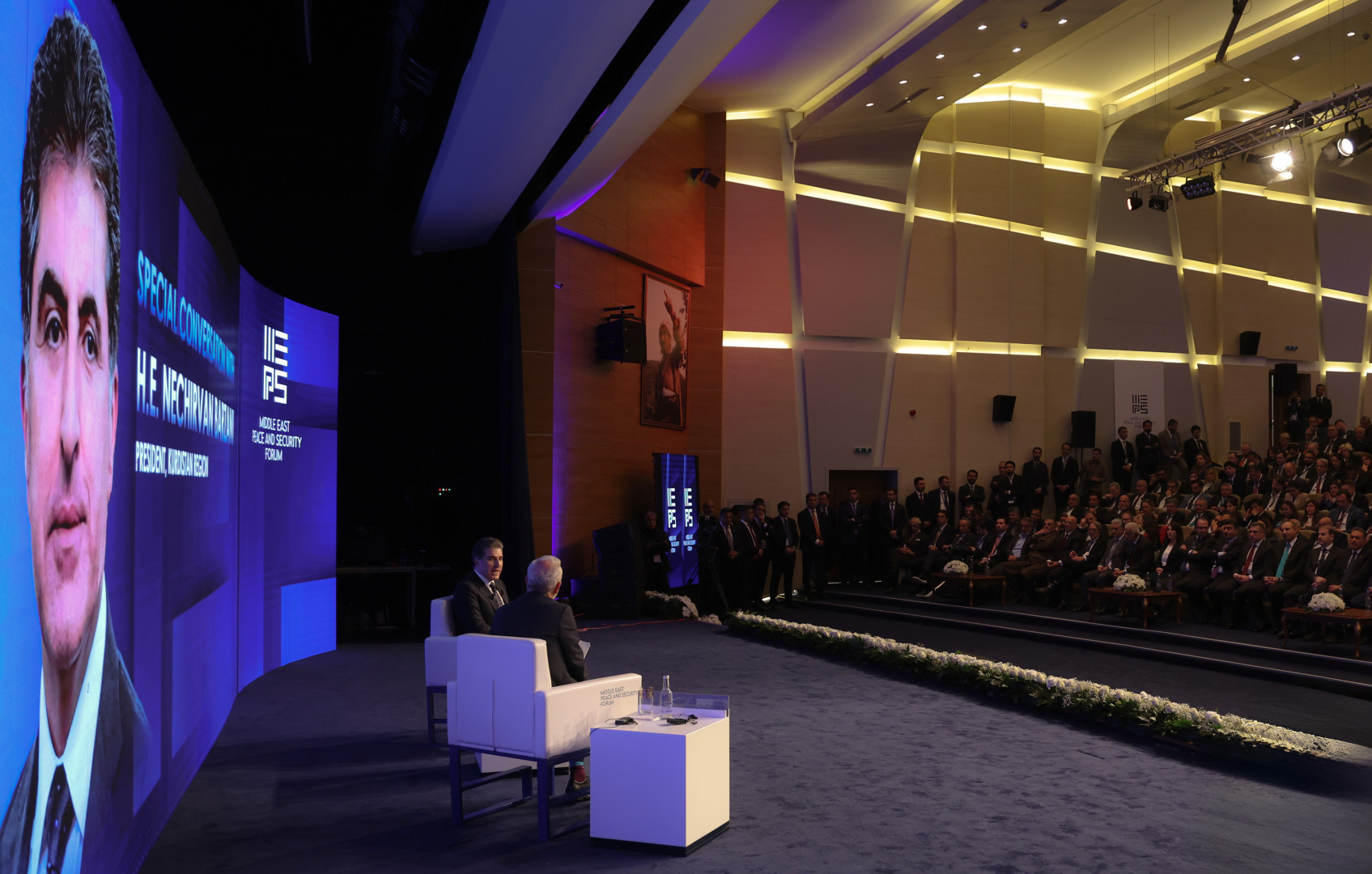
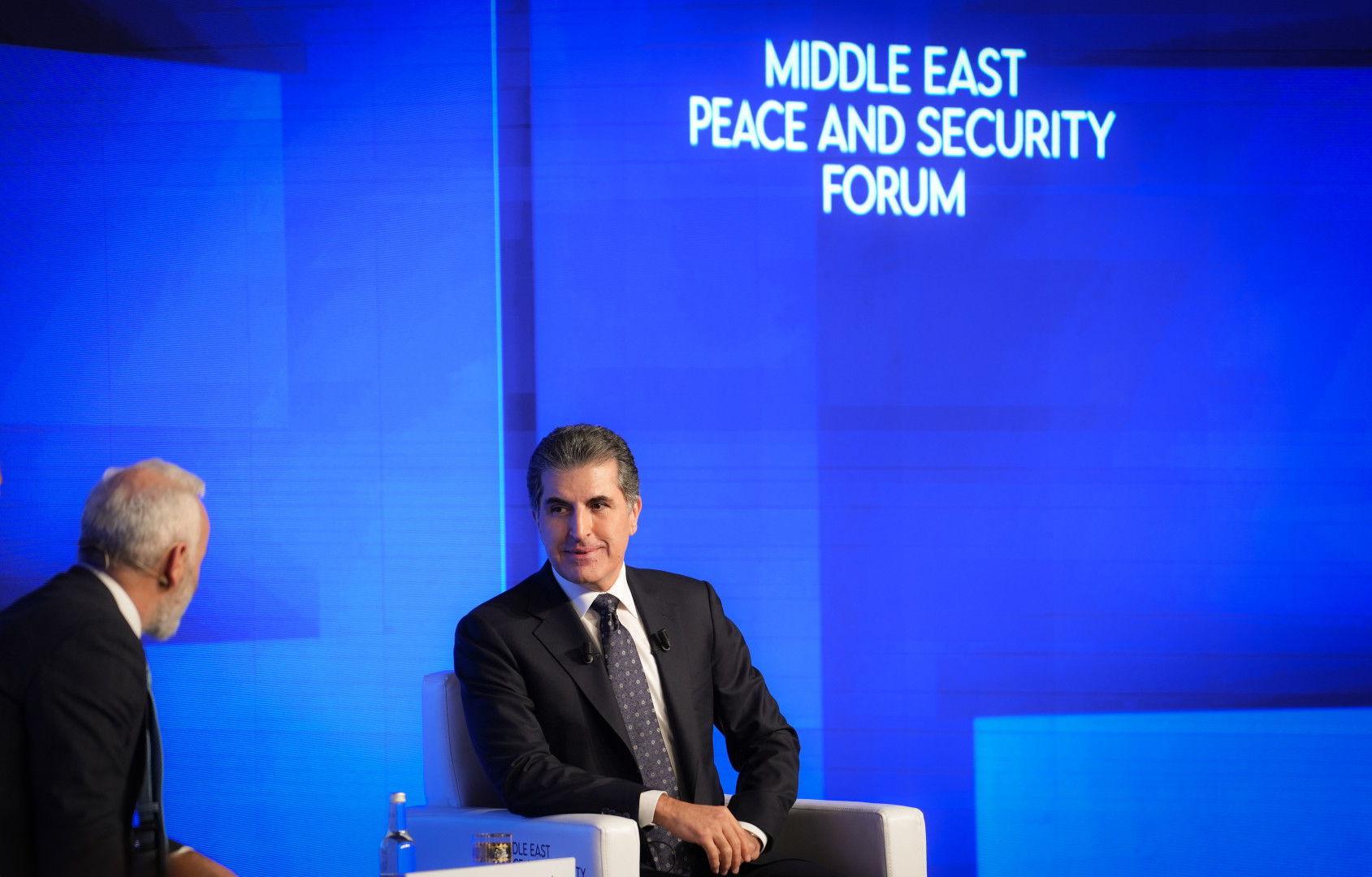
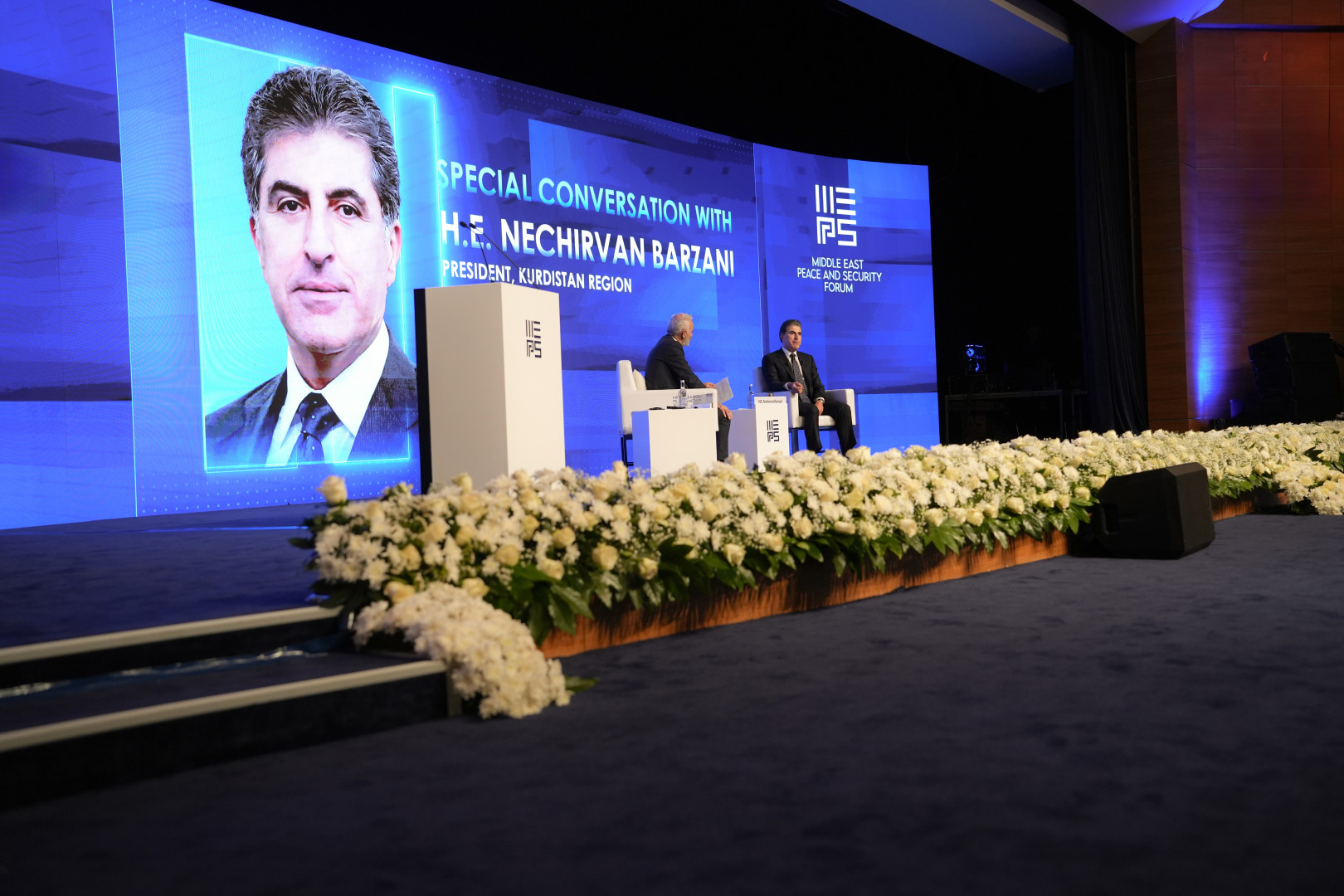
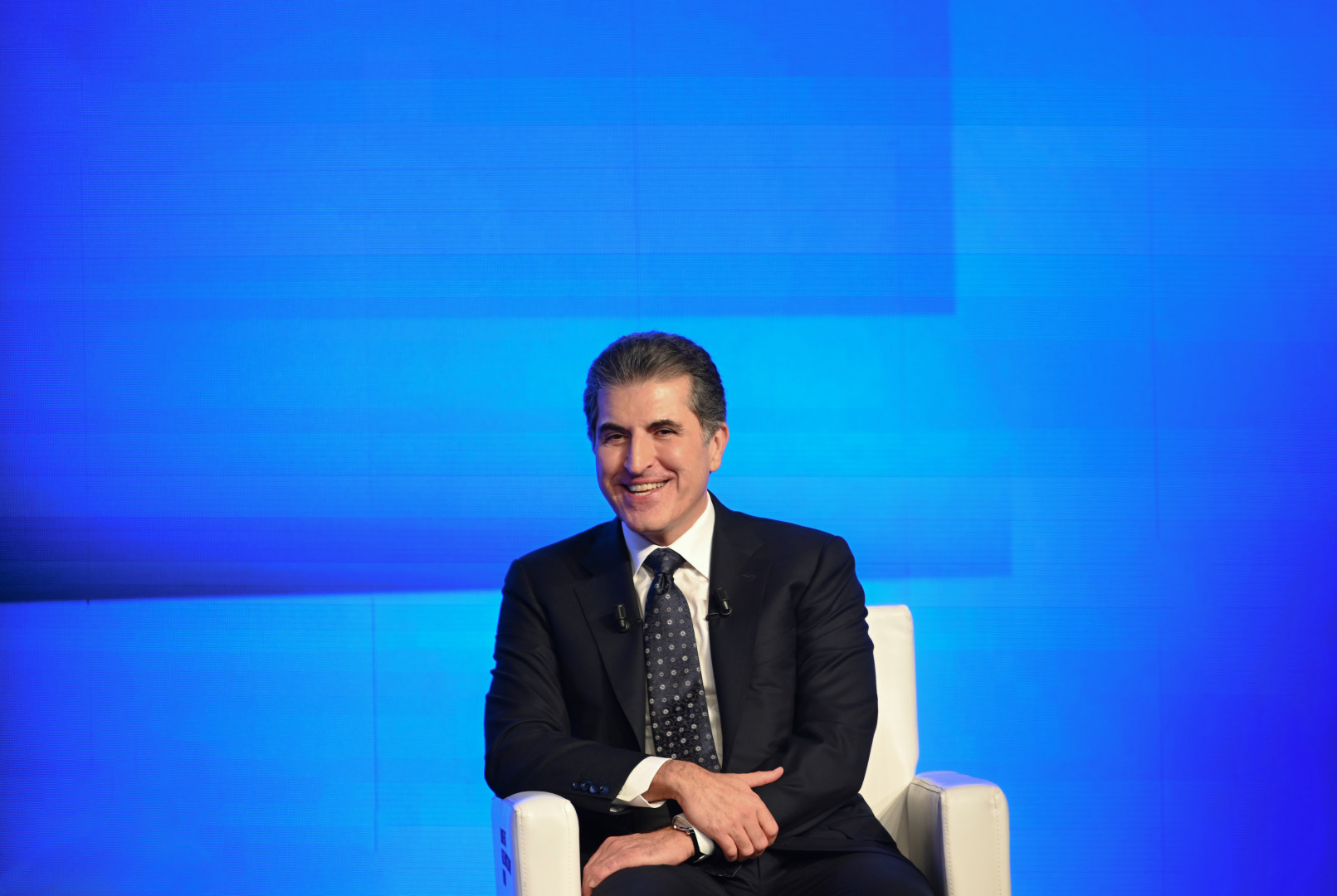
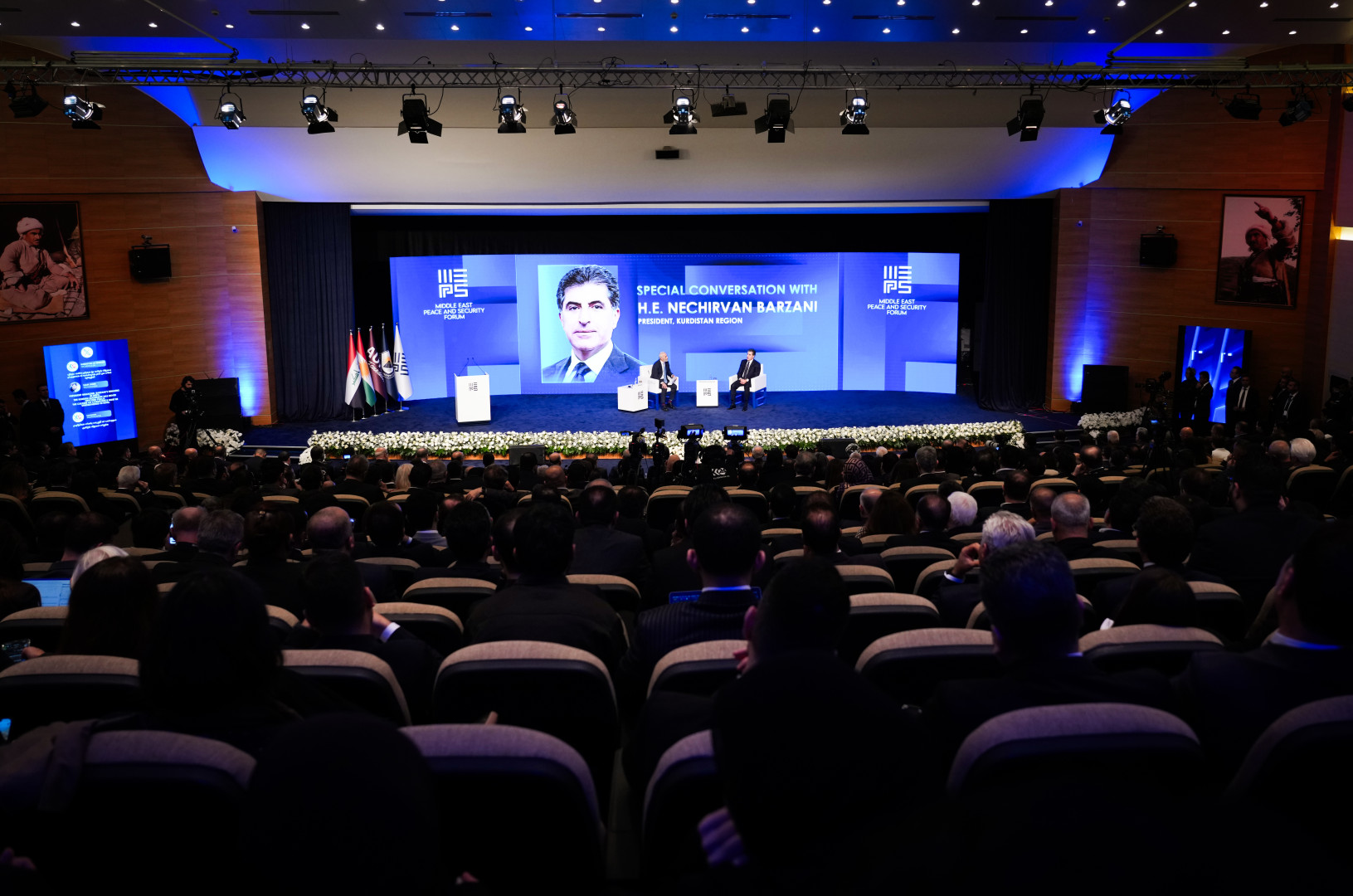
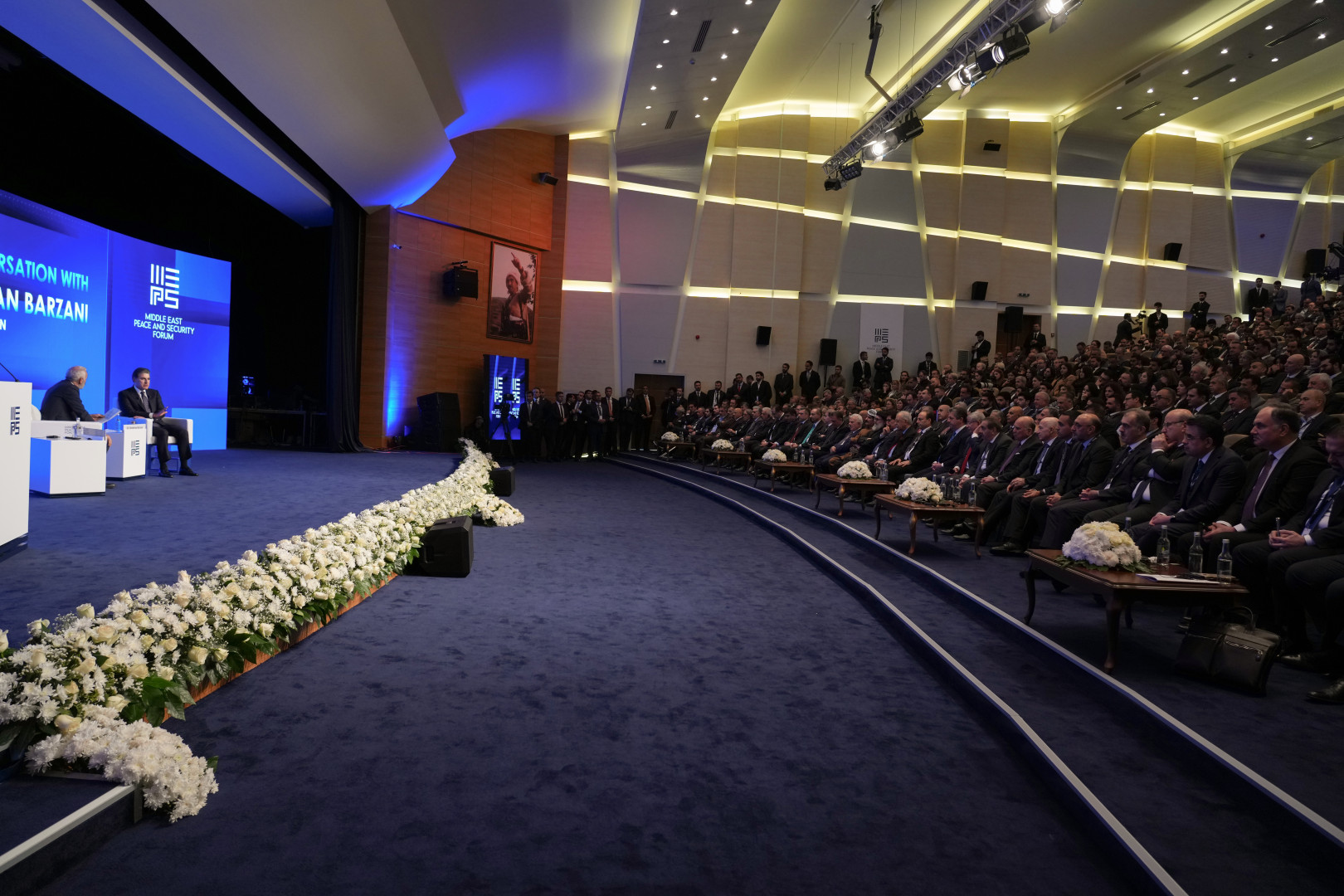





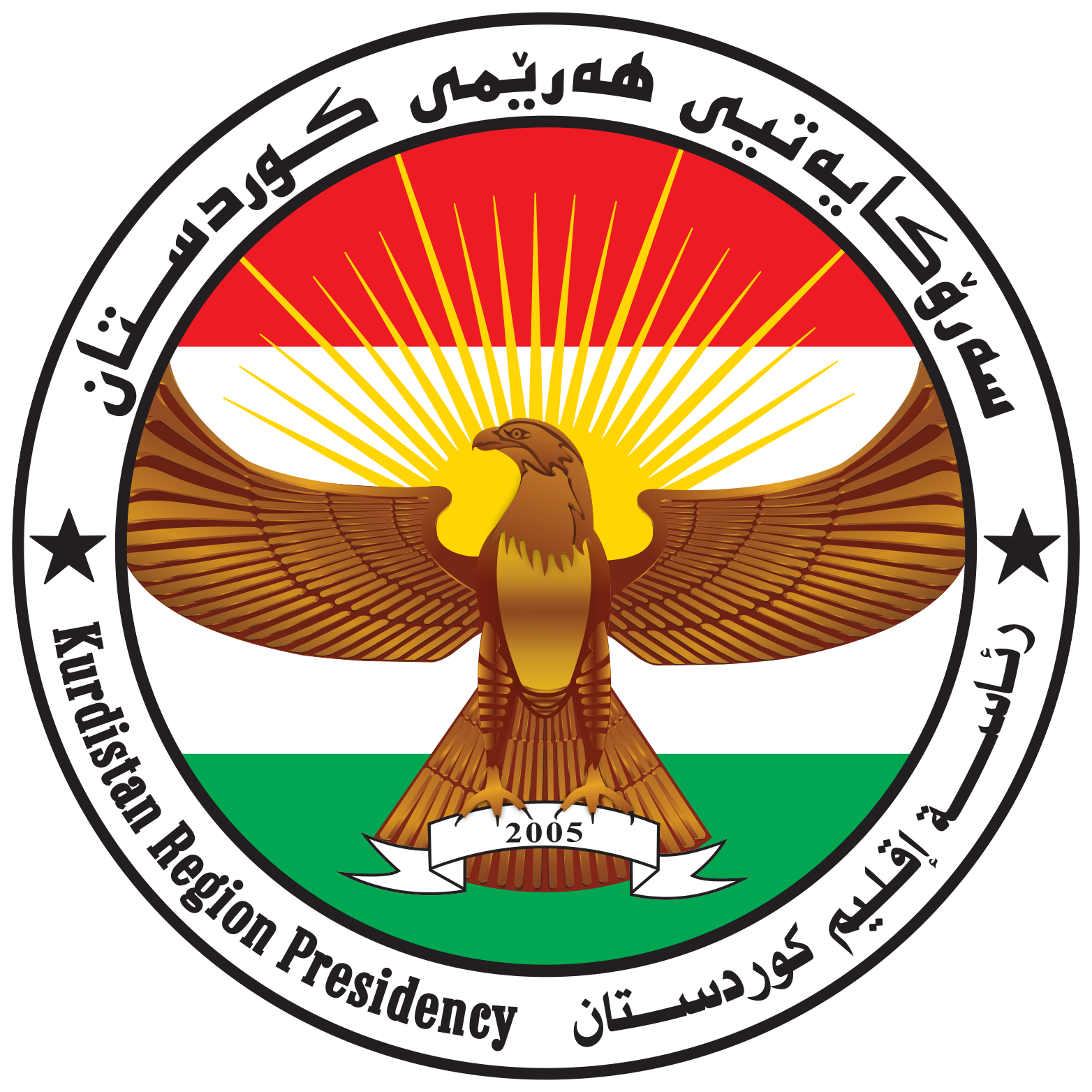

 پەرلەمانی کوردستان
پەرلەمانی کوردستان
